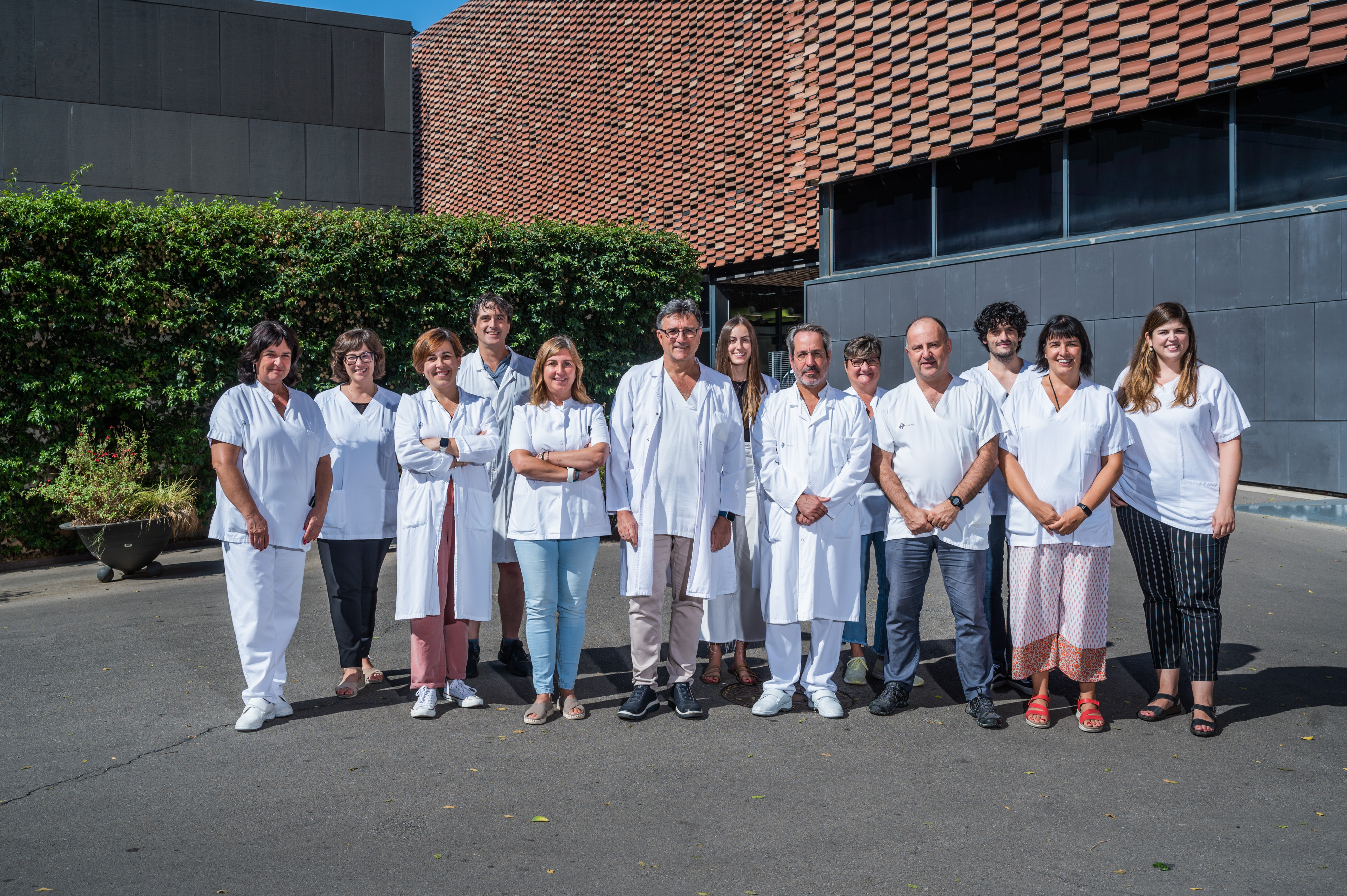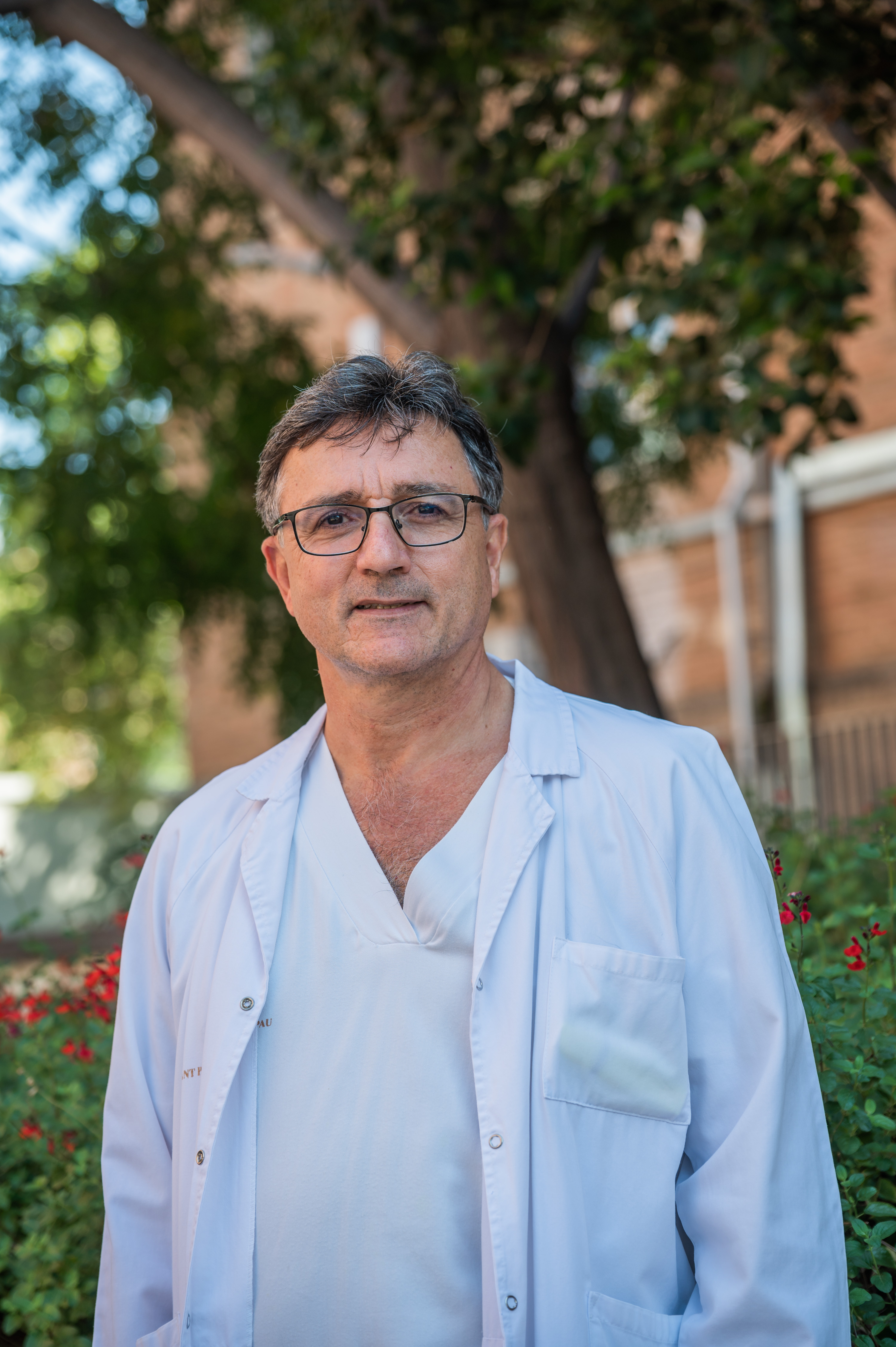


SOUTO ANDRES, JOAN CARLES FGS
jsouto@santpau.cat
Acosta Isaac, Francisco Rene FGS
Carrasco Exposito, Marina FGS
Llobet Lorente, Maria Dolors FGS
Mateo Arranz, Jose FGS
Millon Caño, Juan Antonio FGS
Mojal Garcia, Sergio IR
Moret Puig, Carla FGS
Romero Roman, Lidia FGS
Tirado Garcia, Isabel FGS
Vilalta Seto, Noelia FGS
(JIF 2023)
-Iglesias MJ, Sanchez L, Ibrahim M, Naudin C, Munsch G, Goumidi L, Farm M, Smith PM, Thibord F, Kral JB, Hong M-G, Suchon P, Germain M, Schottmaier W, Dusart P, Boland A, Kotol D, Edfors F, Koprulu M, Pietzner M, Langenberg C, Damrauer SM, Johnson AD, Klarin DM, Smith NL, Smadja DM, Holmström M, Magnusson M, Silveira A, Uhlén M, Renné T, Martinez A, Emmerich J, Deleuze J-F, Antovic J, Soria JM, Assinger A, Schwenk JM, Souto JC, Morange P-E, Butler LM, Trégouët D-A, Odeberg J. Elevated plasma complement factor H related 5 protein is associated with venous thromboembolism. Nature Communications. 2023; 14(1):3280. DOI:10.1038/s41467-023-38383-y. PMID:37286573. IF:14,700 (Q1/1D). Document type: Article.
-Ji YK, Temprano G, Holle LA, Bebo A, Brody JA, Le NQ, Kangro K, Brown MR, Martinez A, Sitlani CM, Suchon P, Kleber ME, Emmert DB, Ozel AB, Dobson DA, Tang WH, Llobet D, Tracy RP, Deleuze JF, Delgado GE, Gogele M, Wiggins KL, Souto JC, Pankow JS, Taylor KD, Tregouet DA, Moissl AP, Fuchsberger C, Rosendaal FR, Morrison AC, Soria JM, Cushman M, Morange PE, Marz W, Hicks AA, Desch KC, Johnson AD, de Vries PS, Wolberg AS, Smith NL, Sabater M, INVENT C, CHARGE Consortium Hemostasis W, INVENT C. Antithrombin, Protein C, and Protein S: Genome and Transcriptome-Wide Association Studies Identify 7 Novel Loci Regulating Plasma Levels. ARTERIOSCLEROSIS THROMBOSIS AND VASCULAR BIOLOGY. 2023; 43(7):e254-e269. DOI:10.1161/ATVBAHA.122.318213. PMID:37128921. IF:7,400 (Q1/1D). Document type: Article.
-Martin L, Garcia I, Lopez S, Martinez A, Vilalta N, Plaza M, Moret C, Vinuela A, Brown AA, Panousis NI, Buil A, Dermitzakis ET, Corrales I, Souto JC, Vidal F, Soria JM. Multiallelic Copy Number Variation in ORM1 is Associated with Plasma Cell-Free DNA Levels as an Intermediate Phenotype for Venous Thromboembolism. THROMBOSIS AND HAEMOSTASIS. 2023; 123(04)DOI:10.1055/s-0043-1760844. PMID:36696913. IF:5,000 (Q1/2D). Document type: Article.
-Martinez N, Vilarino N, Alameda F, Mojal S, Arumi M, Carrato C, Aldecoa I, Ribalta T, Vidal N, Bellosillo B, Menendez S, Del Barco S, Gallego O, Pineda E, Lopez R, Hernandez A, Mesia C, Esteve A, de la Iglesia N, Balana C, Martinez M, Navarro P. Gal-1 Expression Analysis in the GLIOCAT Multicenter Study: Role as a Prognostic Factor and an Immune-Suppressive Biomarker. Cells. 2023; 12(6):843. DOI:10.3390/cells12060843. PMID:36980184. IF:5,100 (Q2/4D). Document type: Article.
-Moret C, Acosta R, Mojal S, Corrochano M, Jimenez B, Plaza M, Souto JC. Clinical outcomes in patients with atrial fibrillation treated with DOACs in a specialized anticoagulation center: Critical appraisal of real-world data. PLoS One. 2023; 18(2):e0279297. DOI:10.1371/journal.pone.0279297. PMID:36827286. IF:2,900 (Q1/3D). Document type: Article.
-Mulet M, Osuna R, Zamora C, Artesero I, Arús M, Vera P, Cordón A, Vilalta N, San P, Abril A, Moliné A, Morán I, López J, Vidal S. Dysregulated neutrophil extracellular traps formation in sepsis. IMMUNOLOGY. 2023; 170(3)DOI:10.1111/imm.13676. PMID:37381594. IF:4,900 (Q2/3D). Document type: Article.
-Muñoz AJ, Souto JC, Lecumberri R, Obispo B, Sanchez A, Aparicio J, Aguayo C, Gutierrez D, Palomo AG, Fanjul V, del Rio C, Viñuela MC, Hernández MÁ. Development of a predictive model of venous thromboembolism recurrence in anticoagulated cancer patients using machine learning. THROMBOSIS RESEARCH. 2023; 228DOI:10.1016/j.thromres.2023.06.015. PMID:37348318. IF:3,700 (Q1/3D). Document type: Article.
-Pardos J, Martin L, Closa L, Ferrero A, Marzo C, Rubio M, Mitjavila F, González JR, Bastida JM, Mateo J, Carrasco M, Bernardo A, Astigarraga I, Aguinaco R, Corrales I, Garcia I, Vidal F. Key Genes of the Immune System and Predisposition to Acquired Hemophilia A: Evidence from a Spanish Cohort of 49 Patients Using Next-Generation Sequencing. INTERNATIONAL JOURNAL OF MOLECULAR SCIENCES. 2023; 24(22):16372. DOI:10.3390/ijms242216372. PMID:38003562. IF:4,900 (Q1/3D). Document type: Article.
-Pujol N, Muniz E, Espanol I, Mojal S, Soler A, Souto JC. Pseudothrombocytopenia, beyond a laboratory phenomenon: study of 192 cases. ANNALS OF HEMATOLOGY. 2023; 102(6)DOI:10.1007/s00277-023-05192-8. PMID:37002444. IF:3,000 (Q2/4D). Document type: Article.
-Ward J, Le NQ, Suryakant S, Brody JA, Amouyel P, Boland A, Bown R, Cullen B, Debette S, Deleuze JF, Emmerich J, Graham N, Germain M, Anderson JJ, Pell JP, Lyall DM, Lyall LM, Smith DJ, Wiggins KL, Soria JM, Souto JC, Morange PE, Smith NL, Trégouët DA, Sabater M, Strawbridge RJ. Polygenic risk of major depressive disorder as a risk factor for venous thromboembolism. Blood Advances. 2023; 7(18)DOI:10.1182/bloodadvances.2023010562. PMID:37399490. IF:7,400 (Q1/2D). Document type: Article.
-COVID-19 Host Genetics Initiative. A second update on mapping the human genetic architecture of COVID-19. Nature. 2023; 621(7977):E7-E26. DOI:10.1038/s41586-023-06355-3. PMID: 37674002. IF:50,500 (Q1/1D). Document type: Letter.
(JIF 2022)